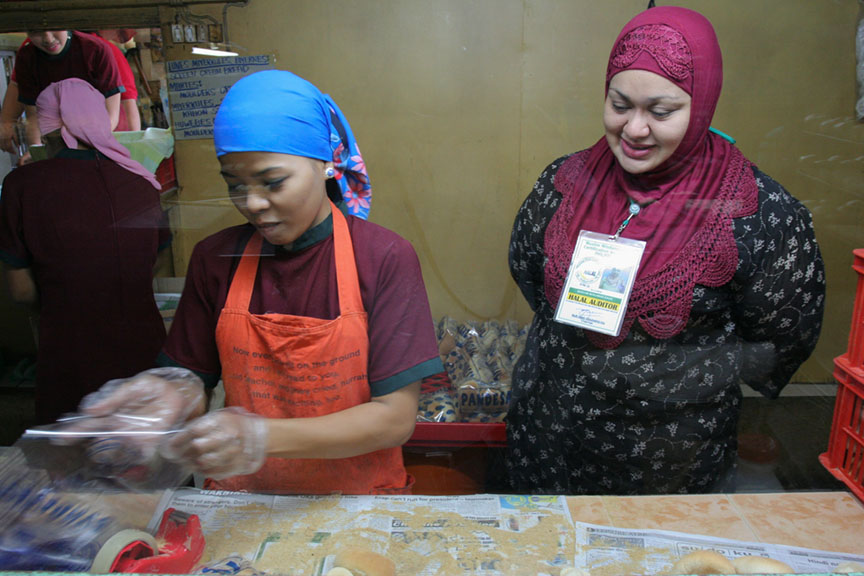DAVAO CITY (MindaNews / 26 March) – Davao City will become a pilot area for Muslim-friendly destinations in the country, Marilou W. Ampuan, trustee of the Davao City Chamber of Commerce and Industry Inc. (DCCCII), said.
 A halal auditor monitors a bakery in Cotabato City. MindaNews file photo by BOBBY TIMONERA
A halal auditor monitors a bakery in Cotabato City. MindaNews file photo by BOBBY TIMONERA
Ampuan told a press briefing on Monday the Department of Trade and Industry (DTI) will roll out the program in collaboration with the Department of Tourism once the National Halal Standard Scheme is launched during the Halal Week from May 1 to 6 at the Marco Polo Hotel Davao.
As a Muslim-friendly destination, the city can compete in the global halal market valued at $3 trillion and will be recognized as a new destination for visitors from Islamic countries, she said.
She said they encourage the more than 20 establishments serving non-pork products to acquire accreditation from the six National Commission for Muslim Filipinos-recognized local halal certifiers in the country, to cater to visitors from Kuala Lumpur, Malaysia.
She said they also hope that more investors will put up halal-certified accommodation establishments and venues for meetings, incentives, conferences, and exhibitions.
Ampuan added there are only eight halal-certified establishments in the region but they are in the process of renewing additional 10 establishments, previously identified DOT-halal recipients in 2016.
Malaysia’s budget airline AirAsia launched on December 21 last year four times a week direct flights from Kuala Lumpur to Davao City.
Qatar Airways also announced that it’s planning to make direct flights to the cities of Davao and Cebu and three other destinations in Southeast Asia between 2018 and 2019.
The six certifiers – National Commission for Muslim Filipinos, Islamic Da’wah Council of the Philippines, Halal Development Institute of the Philippines, Mindanao Halal Authority, Muslim Mindanao Halal Certification Board, Halal International Chambers of Commerce, and UAE-based PRIME – were given until 2019 to function as such.
“They need to undergo another accreditation process with DTI as the new halal standards scheme takes effect, as provided for in the RA 10817, also known as Philippine Halal Export Development and Promotion Act of 2016,” Ampuan said.
RA 10817 established the Philippine Halal Export Development and Promotion Board as the policy-making body that sets the overall direction of the halal industry.
Its mandate includes institutionalizing the involvement of Moro organizations and nongovernment organizations through membership in consultative or advisory bodies, coordination of activities with government agencies concerned with Halal industry development, and participation in regular consultative mechanisms such as public hearings and roundtable discussions.
It formulates, advocates, coordinates, oversees and assesses the implementation of the Philippine Halal Export Development and Promotion Program, among other functions.
The board comprises the DTI secretary as chairperson, NCMF secretary as vice chairperson, and the secretaries of Agriculture, Tourism, Health, Science and Technology, Foreign Affairs, Bangko Sentral ng Pilipinas, Mindanao Development Authority, and two Moro representatives to be appointed by the President. (Antonio L. Colina IV/MindaNews)
